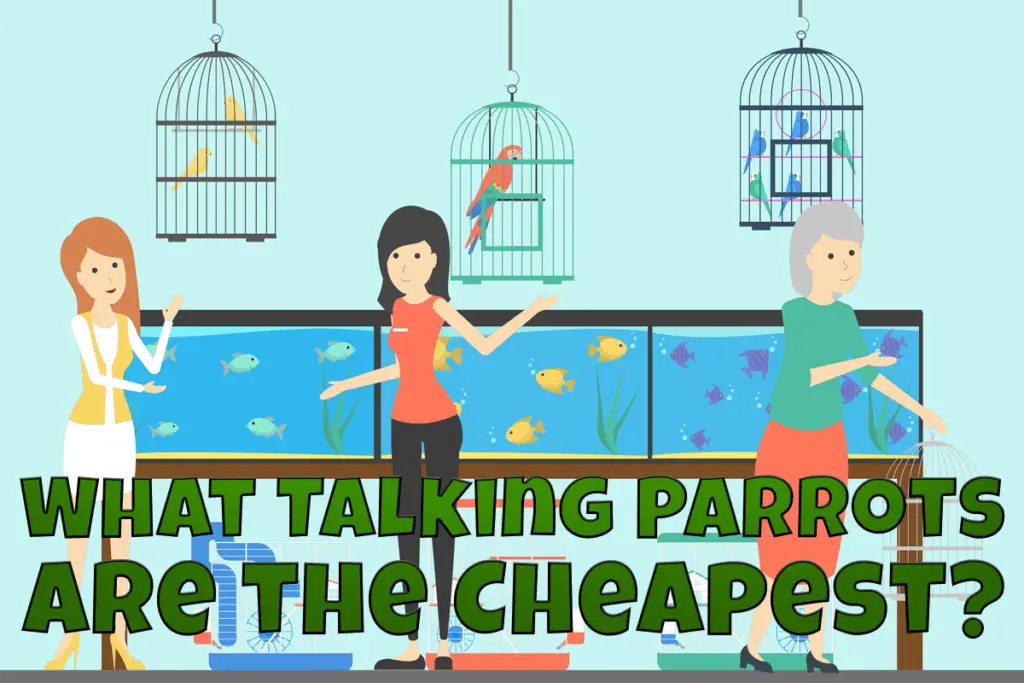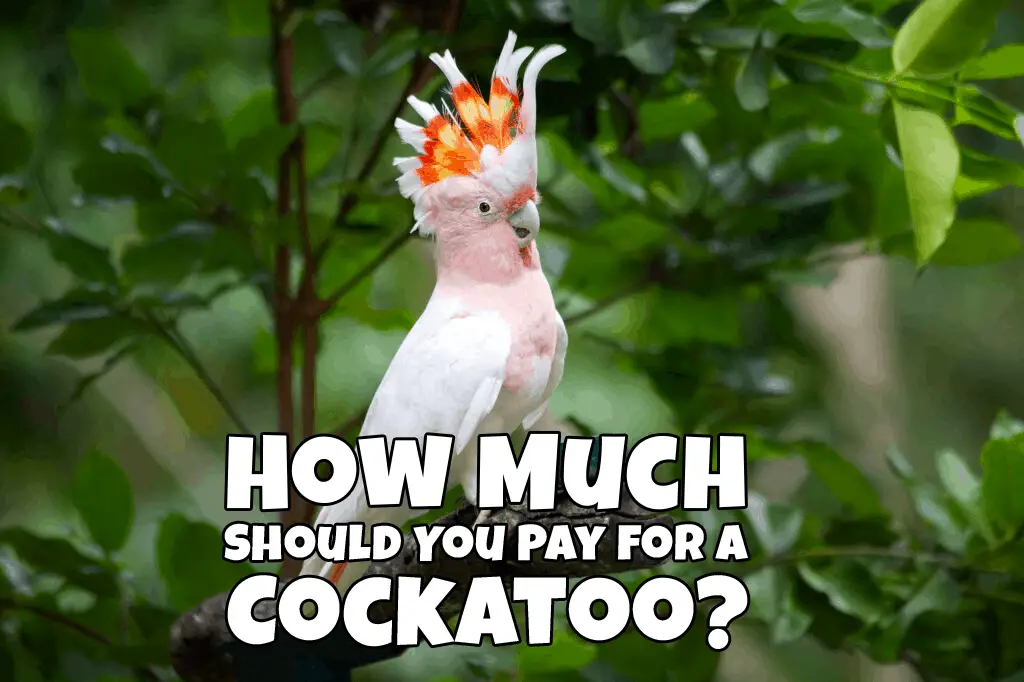Anything can happen when you mesh children and pets in a home together. And I fully understand the worries about the two coexisting peacefully together. But, you want only the best for your family. And your family is your pet as well. So, all parrot owners have an important question to study: Can parrots and children peacefully live together?
Yes, they can! What’s more, they can become best friends if you teach them to behave around each other. Parrots are safe around children as long as those don’t grab the poor bird. Plus, your pet has to be clean and healthy. But, overall, don’t limit their interactions!
To keep the situation clean and safe, you must step up your game as a parent and owner. Keep a lookout for your parrot’s health and any possible infections! Plus, teach your kid how to behave and care for the bird. The key lies in introducing them early on and giving them plenty of time to study each other and bond. And they’ll bond even better than you do with the bird, I guarantee it.
Overall, I’m sure you can deal with your “two” children. However, let’s take a deeper look into how exactly you can achieve that.
Are Parrots Smarter Than Humans? Unexpected Truth
Can You Have Birds in a House With Children?
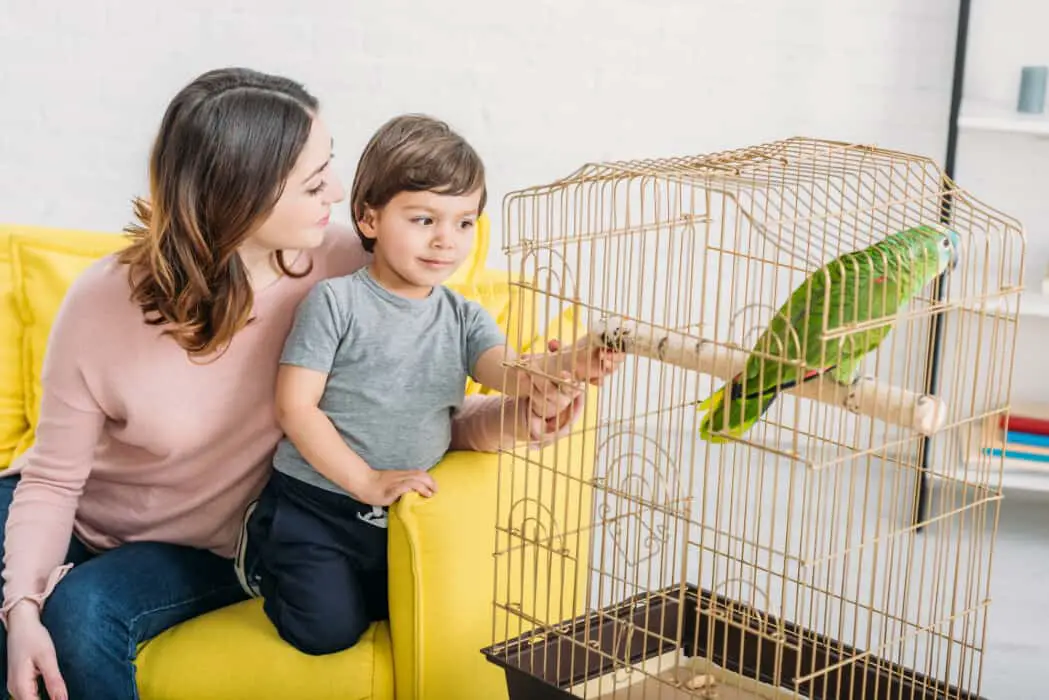
Yes, birds are a safe pet to have around children. They are calmer than cats and dogs and have fewer chances to scratch children. Of course, they carry certain infections, but you can easily notice bacterial issues and treat your pet. In fact, with adults, it’s even more dangerous for a parrot to live with humans than the other way around. Do you remember why kissing a bird should be far away from its beak? We’ve discussed the issues already – check the mentioned article.
Aside from the cleanliness worries, a parrot is not a danger to human children. Unless your kid grabs the parrot and doesn’t let it go, the bird won’t scratch your cutie pie. On the contrary, they can become best buddies in learning how to solve puzzles and speak. Moreover, initially, your parrot will have an advantage in the cognitive area. In time, children do overgrow parrots and start teaching the birds. By the way, you can check an article on parrot intelligence tomorrow! (Probably already out as you read it.)
What Are the Dangers?
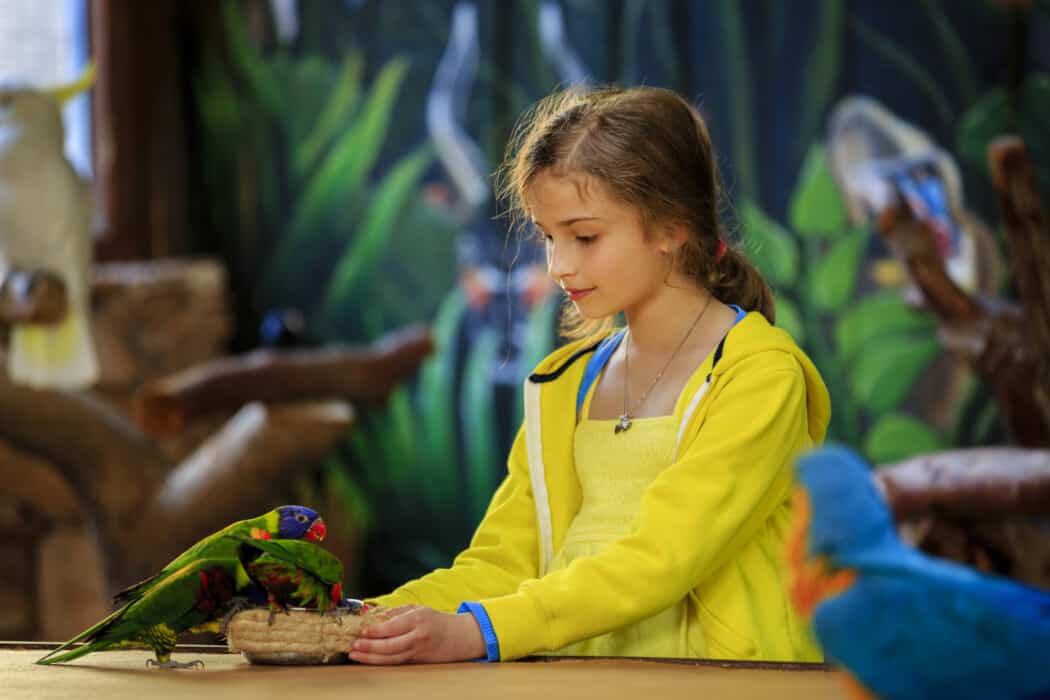
Great news – these rare diseases can be easily avoided with proper care. The main issue lies in the parrot’s diet. If you buy only high-quality ingredients and foods safe for parrots, you can prevent those cases of salmonella, extrinsic alveolitis, and psittacosis.
The latter may become dangerous for your child, whose immune system has not yet formed. The disease can be trouble for adults and children alike, but the chances of transmission are low. Plus, those easy-to-follow hygiene basics can ensure your health.
These bacteria can be contacted directly and inhaled the droppings dust. So, clean the cage regularly. In humans, this disease may show itself as simple flu symptoms but can also affect the lungs and cause inflammation. Thus, your symptoms will be similar to pneumonia.
Fortunately, doctors know how to treat this illness in humans and in birds. And the basic hygiene rules will keep your child from harm’s way.
Another allness, allergic alveolitis, has similar effects as the psittacosis but can either develop relatively fast or drag for years, slowly affecting the lungs. But, once again, the biggest issue comes from dropping. So, if the cage is always clean when your child comes nearby, it’ll remain a healthy child. But precautions are needed.
Lastly, I guess I don’t have to tell you anything about salmonella – you’ve probably studied it anyway before getting pregnant. With salmonella, many things can be contaminated. And your parrot is not even the biggest threat in your home. If your child has an upset stomach, cramping, and diarrhea, it may be salmonella. But it doesn’t mean it comes from the bird. This vicious bacteria can come from anywhere. Even without your notice! Contaminated water and food are the main sources. And your child dragging everything they see in their mouth!
Signs Your Parrot Is Pregnant: Don’t Worry, Be Ready!
How to Introduce Parrots to Babies?
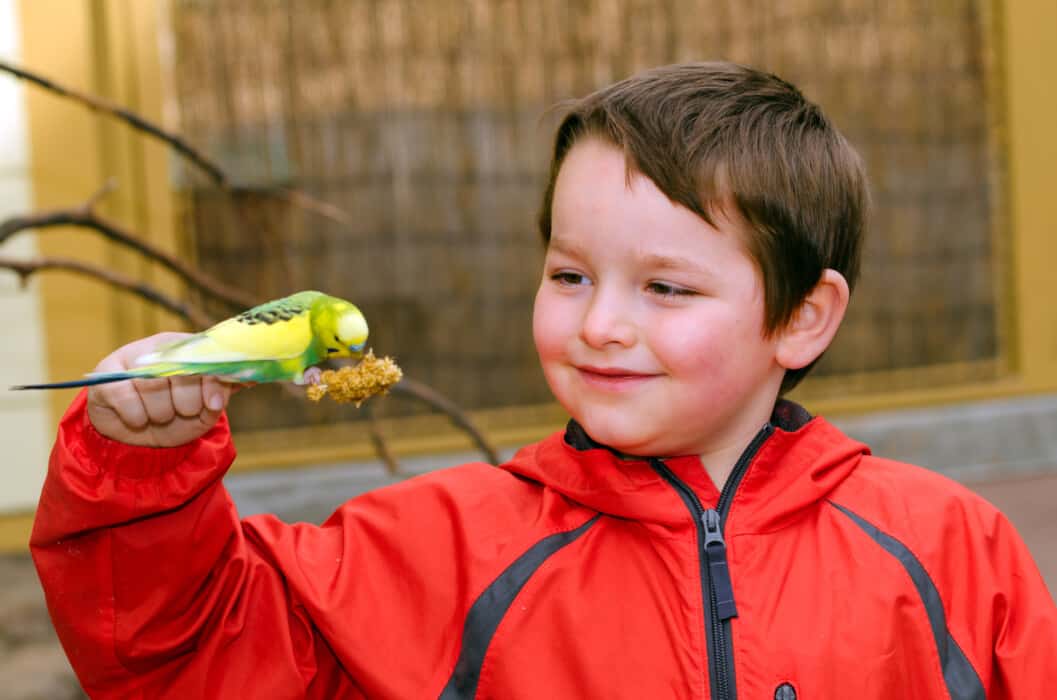
Overall, there are two scenarios.
The first is if you’ve already had a parrot and decided to enlarge your family with a cutie pie! This is where you need to slowly introduce the baby to your pet. It’ll notice the new ember right away and will be curious yet scared. Especially considering the high noise level of all babies. Your kid doesn’t understand what a parrot is yet, but the bird can recognize a new family member. Bring the child closer to the cage and spend more time with the cuties near the cage. This way, your parrot gets used to the baby and will no longer be afraid. Also, check on the bird during those sleepless nights with the baby crying. Parrots are afraid of the dark when they hear loud noises.
Also, I advise setting them in separate rooms but bringing the baby to the cage regularly. During the first months, do not allow them to touch. Even if you clean the cage every hour, your baby’s immunity is too low. But allow your parrot to come closer and participate in your playtime. Playing, singing, and dancing together will help them bond. Give them some time; things will come in the future. Do not give up if they don’t like each other initially.
Baby Pet
If this is scenario number two, yu=ou already have a kid and want to adopt a parrot; it’s of utmost importance to explain to the kid proper care and boundaries. They should understand the physical limitations of grabbing the bird. Teach the kid how to pet a parrot. A small toy can be a great example. Also, teach the child some important details on feeding, so they don’t feed an avocado, for example, while you don’t look. Also, talk with them about the hygienic issues – cleaning hands after interacting with the bird, not touching parrot poo, etc.
Your child has to know how to behave and how to become a good friend to the bird. Then, they can quickly become best friends, especially if the bird is still young.
Also, I guarantee that your kid will love teaching the parrot a few words and phrases! Give them this task for bonding with the bird.
Do Parakeets Grieve Over Lost Partners?
How to Keep a Parrot and a Child Safe?
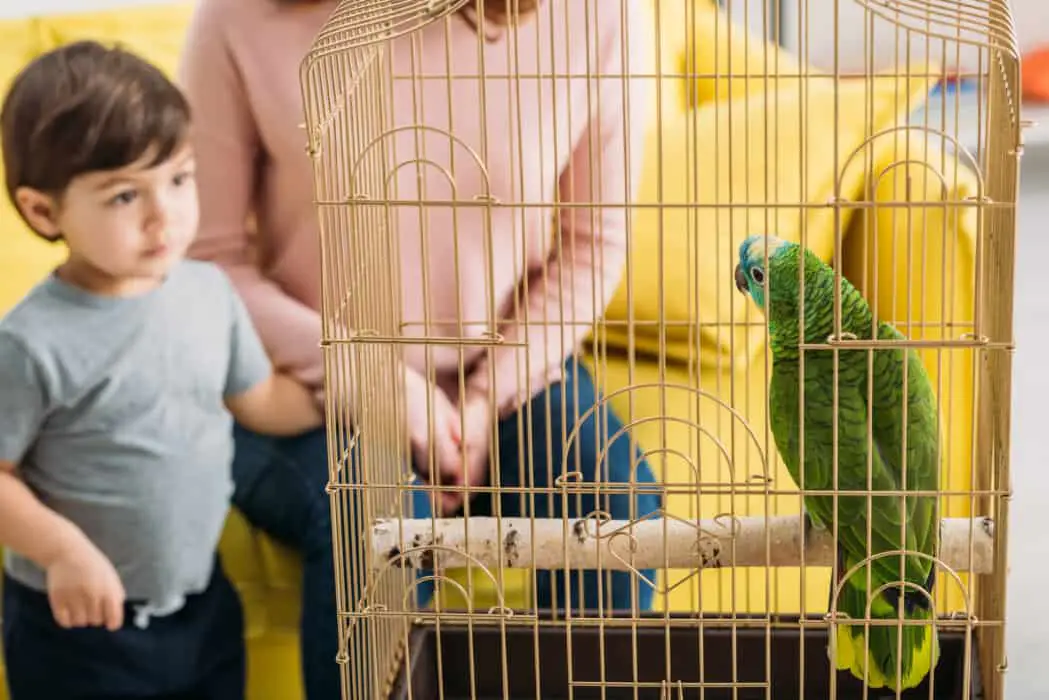
The most important safety tip is keeping the house and cage clean. Illnesses from interacting with parrot poo are the only health hazard that can come from a bird. It is more dangerous to children than adults. However, you have to be an extremely negligent owner to allow things to get to this level. On average, all family members do not catch such transmitted diseases.
Always make sure your child washes the hands after touching the bird. Do not allow them to touch parrot food from the cage as well.
As for the parrot safety, always be around when your kid plays with the bird. Teach the kids to be gentle but still guard.
Also, make sure the bird has a quiet place for the night for its mental health and stability.
If your bird has scratched or bitten your child, call your kid’s doctor immediately and make an appointment. Though it’ll be alright in most cases, you need to exclude complications still.
Can Eclectus Parrots Talk? How Should I Teach Them
In conclusion
Overall, I’d like to highlight that parrots can become great friends with your children. Parrots do become family members and stay with the family for decades. Many parrots love constant child noises as they are highly social and are used to crowds and mayhem in the wild. Others are quieter and will prefer alone time.
Anyway, do not shy away from getting a bid if you have kids, and don’t look for another family for your parrot. All in all, I’m sure that your family will only become happier from this combination. After all, they’ll become great friends.

